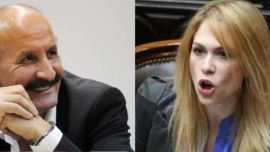Bolivian President Evo Morales is calling for new elections following nationwide protests over a disputed vote that he claimed he had won.
The Movement for Socialism (MAS) leader said he would call for fresh elections Sunday after the Organisation for American States (OAS) said the previous poll — which the opposition had claimed was fraudulent — must be re-run.
Three people have died and hundreds injured in often violent protests since Morales claimed a fourth consecutive term in elections that the opposition charged were rigged.
Morales, speaking in a TV address, said he would "call for new national elections, which, by voting, allow the Bolivian people to democratically elect new authorities."
Shortly before his announcement, a preliminary report by the Organisation for American States (OAS) recommended fresh elections, saying it had found irregularities.
"The first round of the elections held last October 20 must be annulled and the electoral process must begin again," it said.
The OAS added that the first round of the elections should take place as soon as a new electoral commission is in place.
Morales did not mention the OAS report. He called on all political parties and all sectors to help bring peace to Bolivia. The announcement comes a day after police in three cities joined anti-government protests and his call on Saturday for urgent, open-ended dialogue with the opposition was rejected.
After the October 20 vote, Morales declared himself the outright winner even before official results indicated he obtained just enough support to avoid a run-off with opposition leader Carlos Mesa. But a 24-hour lapse in releasing vote results raised suspicions among opposition supporters that there had been fraud.
Protests
Opposition demonstrators in Bolivia overran two state-run media outlets and forced them off the air Saturday and some police stopped guarding the square where Morales' palace is located.
Demonstrators burst into the offices of Bolivia TV and Radio Patria Nueva and forced employees to leave, accusing them of serving the interests of Morales, said the director of the latter of the two, Ivan Maldonado.
"We were evicted by force after receiving constant threats from people gathered outside," Maldonado told AFP.
Some 40 employees were seen leaving the building that the two news organisations share in La Paz, walking hand in hand as a crowd of some 300 demonstrators yelled insults. Afterward, both outlets broadcast only music.
It was the latest thrust of a movement protesting alleged vote-counting fraud in the election last month that gave Morales a fourth straight term.
Morales denounced the seizure of the media outlets. "They say they defend democracy, but they behave as if they were in a dictatorship," he tweeted.
A radio station run by a farmers' union was also seized by protesters, Morales said. He said opposition militants had also set fire to the home of his sister in the southern city of Oruro as part of what he called an effort to overthrow him.
Sister's home set on fire
Footage on social media showed the home of his elder sister Esther partially in flames. The homes of the regional governor and that of Chuquisaca province governor were also set on fire.
Morales called earlier in the day for urgent, open-ended dialogue with opposition parties holding seats in the National Assembly, but he pointedly excluded the powerful regional civic committees opposing him.
Mesa immediately rejected Morales's gesture, saying, "We have nothing to negotiate with Evo Morales and his government."
A police rebellion erupted Friday among an elite tactical operations unit called UTOP in the central city of Cochabamba. It then spread to units in Sucre, the constitutional capital, and Santa Cruz, a bastion of opposition strength in the east.
During the night the rebellion reached other cities but mostly spared La Paz, the country's administrative capital, local media reported.
But in a worrying sign for the Morales government, the UTOP officers in La Paz who for weeks have closely guarded the central Plaza Murillo – where the presidential palace is located – withdrew to their quarters Saturday in evident solidarity with the protests, an AFP reporter observed.
The sector remained guarded only by a small number of officers.
Opposition groups have branded the election result a fraud and demanded Morales's resignation. Three people have died so far and hundreds injured in unrest triggered by the protests.
The leftist president, Bolivia's first from the indigenous population, assailed the police action. Morales said Friday on Twitter that "our democracy is at risk from a coup d'état launched by violent groups undermining the constitutional order."
Opposition leaders urged the military to follow in the footsteps of the rebellious police.
Defence Minister Javier Zavaleta said there was no plan to send troops to subdue the police.
'Defend'
The governing Movement for Socialism called on party supporters to come to La Paz to "defend" the results of the vote that kept Morales in power for an unprecedented fourth term.
Buses carrying opposition activists to La Paz came under attack Saturday by Morales supporters in rural Vila Vila, about 100 miles (160 kilometres) southeast of La Paz, an opposition leader, Rodrigo Echalar, said on television.
Up to now, the streets of La Paz have mainly been occupied by anti-government protesters, but on Friday night some of them marched side-by-side with the policemen who had earlier put down their protests.
An AFP reporter witnessed dozens of police marching alongside opposition activists in central La Paz, shouting anti-Morales slogans.
Mesa, who came in second in the October 20 election, joined former presidents Jaime Paz Zamora and Jorge Quiroga in urging the military not to put down the protests.
Quiroga reminded the troops that five former military chiefs remain in prison over the deaths in 2003 of anti-government protesters.
In La Paz, dozens of protesters marched to the Military College to urge the troops to join the push for Morales's resignation.
In some neighbourhoods, people celebrated the police rebellion as if Bolivia had won an important soccer match.
Morales has insisted that the October elections were fair and transparent.
– TIMES/AFP/AP


























Comments